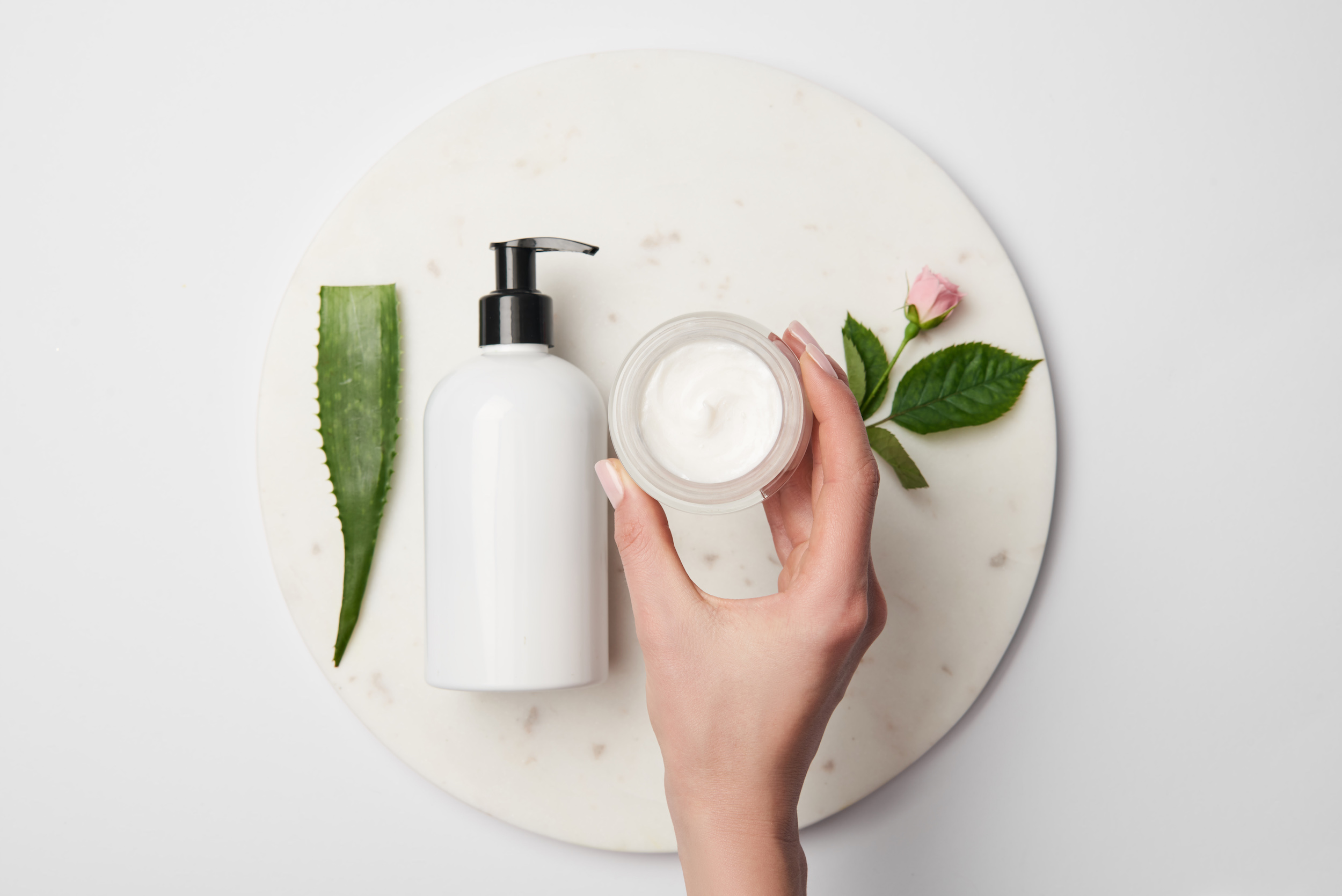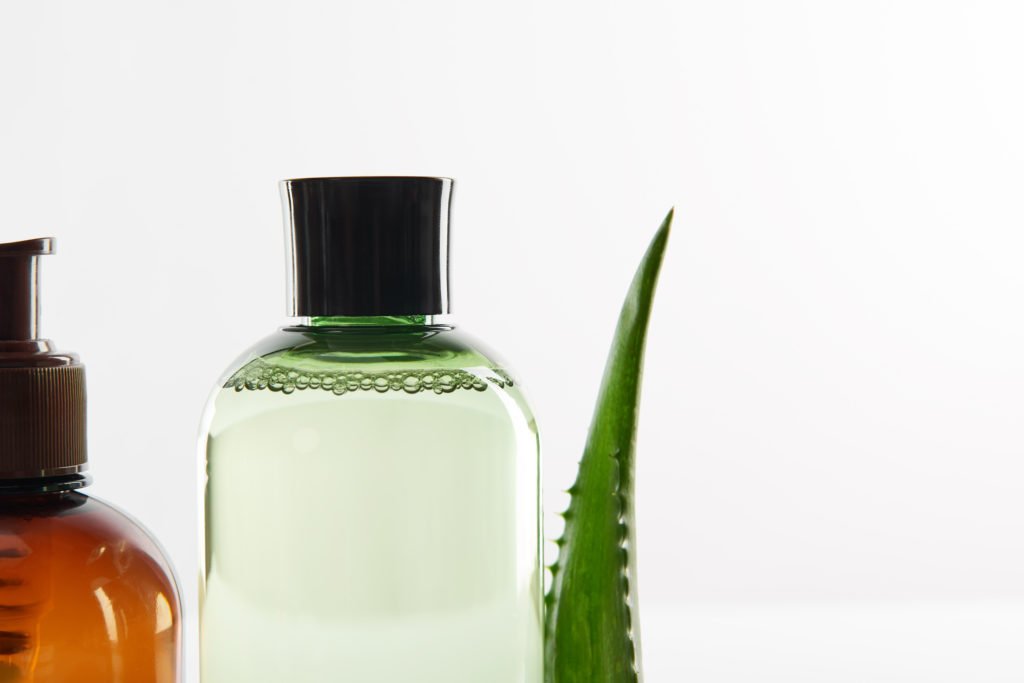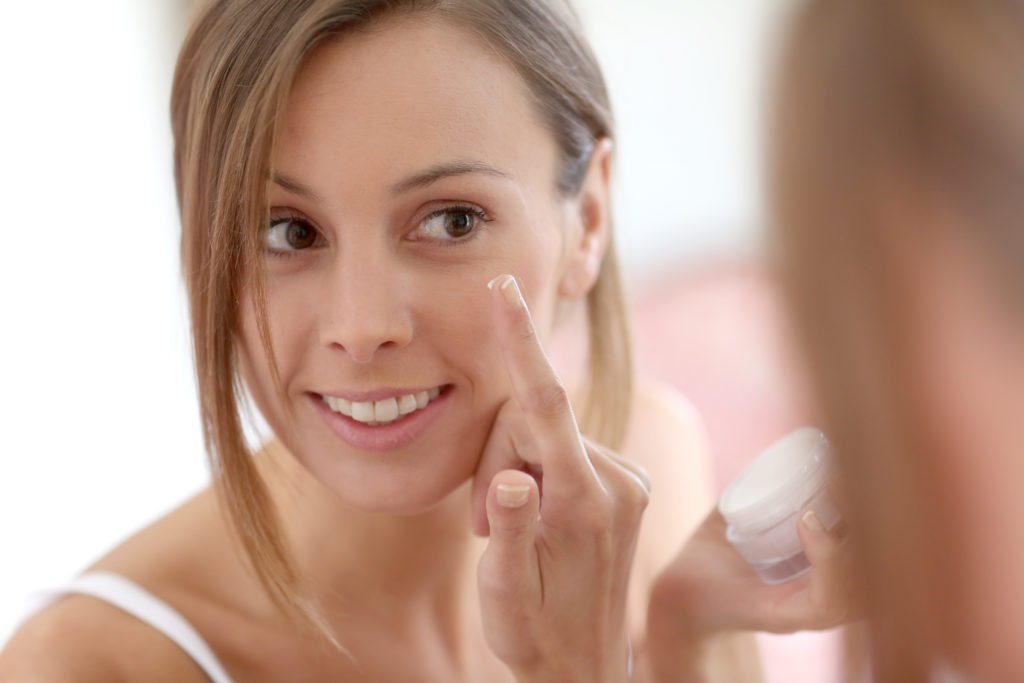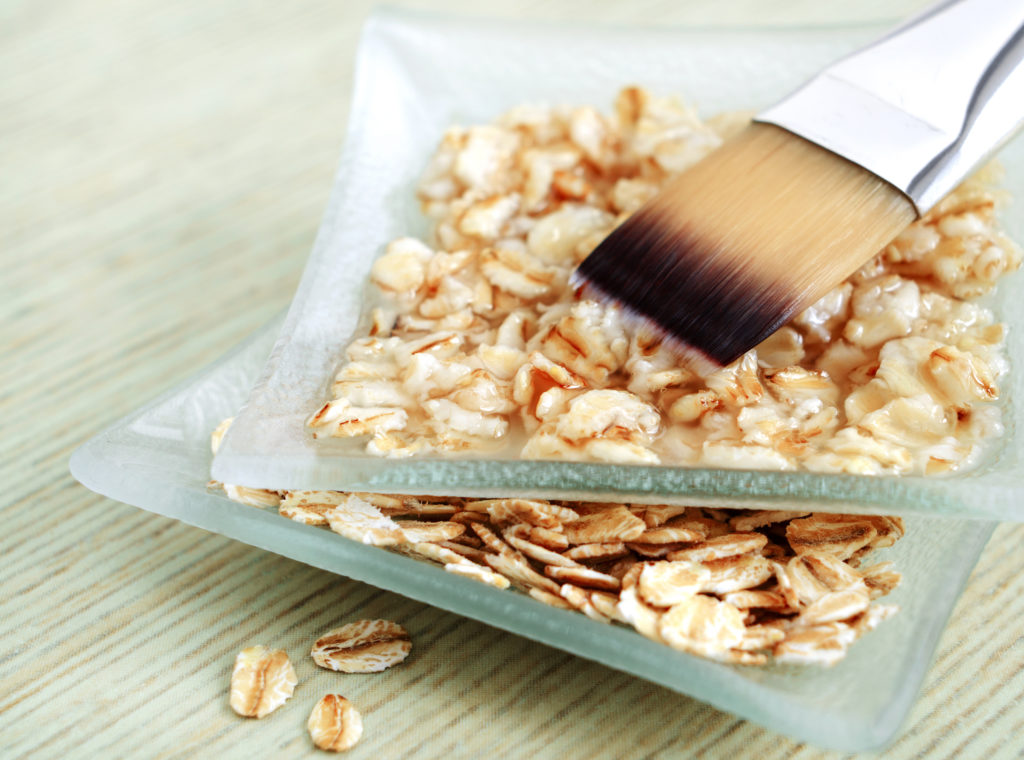
Inside This Post: 11 Natural home remedies for dry skin in the winter. Natural remedies to add to your skin care routine and treat dry skin, and moisturize dry, itchy skin.
This post may contain affiliate links. You can see my disclosure policy here.
Home Remedies for Dry Skin in Winter
In the winter months, when the humidity decreases and colder whether takes over, dry skin can become an irritating, and even painful problem.
The list of culprits that can cause dry skin is a long one, from chlorine in your bathing water, to scrubbing yourself with a towels, lack of natural oils in your skin as you get older, and climate.
The good news?
You don’t need to ring up your dermatologist to heal your dry skin in winter. Instead, you can reach for natural remedies you probably already have in your home, to include in your skin care routine and make a world of difference to your dryness.
How Can I Get Rid of Dry Skin in Winter?
The first thing I want you to do is change your drinking and bathing water habits and toss skin care products that are water-based and chemical laden. Here’s why:
Chlorine & Chloride in Tap Water Dry Out Your Skin
Most tap water which makes up your drinking water, bath water and shower water contains chlorine and chloride, both of which dry out your skin, not to mention give off fumes that are dangerous to your health.
You can safely and very easily remove the chlorine, chloride and metals in your bath water using natural means of Vitamin C powder, baking soda and epsom salts. Here’s an article explaining how to remove chlorine from bath water before you slip in, and especially if your kids take regular baths!
You can add filters to your shower head that will also filter out chlorine and chloride from your water, before it gets on your. I installed this Vitamin C shower filter myself in two minutes flat and have noticed my skin isn’t itchy or as dry as it was before we began using the filter.
Alcohol, Fragrance & Chemicals Found in Skin Care Products Dry You Out
Over-the-counter products have a ton of ingredients in them – a lot of them that aren’t disclosed or regulated – that not only contain moisturizing ingredients, but also preservations such as alcohol and fragrances.
Most skin care products have a water-based solution, but these contain preservatives like alcohol, fragrances, petrolum distillants and parabens. All chemicals you want to avoid and do damage not only to dry skin, but increase your toxin exposure.
Natural remedies and pure oils have a oil-base / natural base that are chemical free and won’t dry out the skin. Plus, you really want to try to avoid putting these chemicals directly onto your skin and even, into your bloodstream for safety reasons.

How Can I Hydrate My Skin in Winter?
There are several ways you can change up your routine to boost moisture and avoid dry skin in the winter. These little changes to your habits will help keep dry skin at bay during the cooler months.
Take Warm Showers, Avoid Hot Showers
I know how good a hot shower can feel, especially on a cold day when you feel frozen, but your skin will disagree.The American Academy of Dermatology notes that relieving dry skin is sometimes as simple as changing your shower routine. Hot water scalds and dries out skin, so it’s best to stay with warm showers and use gentle, non-toxic shampoos and soap you can find to limit drying out.
Moisturize When You Get Out of the Shower
Your body will soak up moisturizers when your body is straight out of the shower and bath and your pores are still open from the warm water. Lotions will lock in moisture when your skin is moist itself.
Exfoliate and Dry Brush
Removing dead skin cells allows for fresh skin cells to come to the surface. We often forget to slough off dead cells in the winter, thinking it’ll make our dry skin worse. Yet, moisture can’t get in unless you have fresh cells on the surface to hydrate better and absorb moisturizers. Be sure to have a oil-based moisturizer that are non-toxic.
You can exfoliate by using a sugar scrub, taking a once-a-week detox bath using epsom salts and gently dry brushing your skin.
We often forget to help the skin slough off dead cells in the winter, particularly on our hands. Yet moisture can’t get in if the dead cells are too plentiful. Find an exfoliating mask and use it on your face and your hands, as well as gently on your lips, then follow immediately with moisture to truly see a smoother difference. Exfoliating body washes are also helpful in the winter months.
Drink Half Your Body Weight in Water
Your body is made up of 70% water and in order to stay moisturized, it’s important to drink half your body weight in filtered (safe) water each day.
We use an aquagear water filter in our fridge and have an under the counter reverse osmosis water system under the sink (this is the least wasteful and most reasonably affordable one I could find with a UV light to kill bacteria and microorganisms and has a 9 stage filter) for cooking water, filling the dog’s water bowls and water bottles.
I also carry a 32oz stainless steel water bottle and drink 3 bottles each day. It’s more than half my body weight, but it keeps my body completely hydrated and helps me digestion, energy and stay healthy.

11 Natural, DIY Remedies to Moisturize Dry Skin
These are natural ways you can remedy dry skin and lock in moisture so you don’t feel itchy or irritated this winter, any time you have seasonal and climate changes.
Don’t Use Soaps that Strip Moisture
Most soaps, especially bar soaps, can dry out the skin and leave it feeling rough and itchy. Choose a gentle, non-toxic and fragrance free hand soap or bar soap so you don’t lose your skin’s natural moisture.
Skip the Hand Sanitizer
Most store bought hand sanitizers contain alcohol which strip the skin’s natural moisture and create chapped, cracked and dry hands and skin.
Hand washing has been found to be just as effective as hand sanitizers, although if you prefer to have hand sanitizers readily available, the Everyone Hand Sanitizer Gel Coconut + Lemon 8oz or a 6-pack of the 2oz version makes it easy to tuck in your purse, backpacks, diaper bags, in the car and keep one at home too! (It also has a top safety from EWG Skin Deep)
Coconut Oil
A medical study conducted in 2014 found that coconut oil significantly improved skin hydrated and number of lipids (fats) on the surface of the skin.
That’s because coconut oil has natural emollient properties. which means the emollients fill spaces between skin cells to create a smooth, hydrated surface. The saturated fatty acids found to naturally occur in coconut effectively hydrate the skin.
Coconut oil is gentle enough to include in your everyday moisturizing routine, even thin skin areas which would typically be more sensitive to over-the-counter products, such as underneath the eyes, and around the mouth.
Coconut oil can be used straight from the container and doesn’t need to be mixed with anything to work.
When things get cold, the humidity drops and especially when you turn the heat on in your home, the dryness strips your skin of moisture. Keeping a humidifier in your home, particularly the bedroom, can help reduce the dryness (as well as side effects like blood noses and coughing.)
Setting a humidifier to 60% will counteract the dryness in your home, according to Harvard Medical School. by putting moisture back into the air.

Oatmeal Bath
Oatmeal has been a natural remedy that’s been used for thousands of years and this study found it to be a safe option for moisture treatment with no allergies reported by consumers of 445,820 products sold during a 3-year period.
Oatmeals has effective moisturizing, cleansing, antioxidative, and anti-inflammatory properties.
Adding a cup of oatmeal (colloidal oatmeal is ground and great for this purpose) to a warm bath by scattering the mixture with running water, is a natural way to add hydration to the skin. Not only is the oatmeal soothing and helps calm irritated and dry skin, it also helps your skin retain moisture from the bath (just make sure you remove the chlorine and chloride from bath water first.)
Soak in the warm water for 15 – 20 minutes, using the oatmeal bath up to twice a day based on dryness and doctor approval.
After you take an oatmeal bath, use a non-toxic cream to lock in the moisture.
Add Natural Oil to the Bath
Natural oils are known for their moisturizing super powers and help to recreate the natural skin barrier, which is often damaged by frequent hand and face washing with water and drying soaps that strip the skin if its natural oils.
You can use olive oil, coconut oil, jojoba oil, argan oil and avocado oils and other natural oils that are free from irritants and add a few tablespoons under the running bath water.
You can also add a few drops to your moisturizer and apply post bath or shower to keep your skin soft and subtle.
Load up on Antioxidants
When you expose your skin to the elements, inevitably it causes some damage to the skin cells and results in dryness and chapped feel. There are foods you can use to heal you from the inside and these serve as antioxidants to help your skin appear healthier, according to the Mayo Clinic.
Antioxidant rich foods help to minimize damage from exposure to the elements and toxins, and also repair skin cells. Some of the foods that contribute to skin health include:
- blueberries
- blackberries
- tomatoes
- carrots
- beans
- peas
- lentils
Eat Hydrating Foods
Hydrating foods like watermelon, cantaloupe, apples, oranges, kiwi, and watery veggies like celery, tomatoes, cucumbers, zucchini, and carrots are high in water content and help hydrate the body from the inside out.
Protect Against Weather Exposure
When the weather changes and the wind begins blowing, it’s best to wear protective gear from the elements not only to keep you warm, but to keep your skin from being damaged.
Wearing gloves, scarves, glasses, and hats protect skin from cold winds, rain, and snow.
Sunscreen are important all year long. Choose a mineral based sunscreen (zinc oxide and titanium dioxide) and stay away from sprays, even if it’s mineral based. The spray can is a good indicator the chemicals used to spray are toxic.
Avoid Irritant Exposure
Irritants in clothing, cleaners and laundry detergents have allergens that can cause allergic reactions, and exacerbate skin conditions like eczema, dermatitis, and psoriasis.
Winter skin is fragile, so stay clear of irritants in your products like chemical-laden detergents, cleaners and cleaning products (you should consider this a year-round prescription) and irritating fabrics like wool.
Use a Honey Face Mask
This 2012 review found that some studies have shown honey to be beneficial for many types of skin diseases and that it may be used as an at home treatment to nourish dry skin, and can be applied directly.
Various studies on the natural properties of raw honey found it to be:
- moisturizing
- healing
- anti-inflammatory
Here are several honey based face mask recipes and one store-bought kind if you’d prefer this version:
Basic Honey Face Mask
Massage 1 tbsp honey in circular motions on damp skin, letting it sit for 2-5 minutes before rinsing with warm water. You can also spread a layer over clean, dry skin and let it sit for 15-30 minutes before rinsing off.
Acne Prone Honey Mask
Mix 3tsp honey and 1 tsp cinnamon together, and apply to your face. Leave the mask on for 10-30 minutes. The antibacterial properties of both honey and cinnamon make thishoney mask perfect acne-prone skin
Avocado & Honey Dry Skin Mask
Mix 1tsp avocado, 1tsp honey and 1tsp organic plain yogurt in a small bowl until smooth. Spread the mixture over your face and let it sit for 20-30 minutes before washing it off.